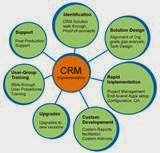What Is CRM?

.jpg) CRM, or Customer Relationship Management, is a company-wide business strategy designed to reduce costs and increase profitability by solidifying customer satisfaction, loyalty, and advocacy. True CRM brings together information from all data sources within an organization (and where appropriate, from outside the organization) to give one, holistic view of each customer in real time. This allows customer facing employees in such areas as sales, customer support, and MARKETING
CRM, or Customer Relationship Management, is a company-wide business strategy designed to reduce costs and increase profitability by solidifying customer satisfaction, loyalty, and advocacy. True CRM brings together information from all data sources within an organization (and where appropriate, from outside the organization) to give one, holistic view of each customer in real time. This allows customer facing employees in such areas as sales, customer support, and MARKETINGCRM, or Customer Relationship Management, is a company-wide business strategy designed to reduce costs and increase profitability by solidifying customer loyalty. True CRM brings together information from all data sources within an organization (and where appropriate, from outside the organization) to give one, holistic view of each customer in real time. This allows customer facing employees in such areas as sales, customer support, and marketing to make quick yet informed decisions on everything from cross-selling and upselling opportunities to target marketing strategies to competitive positioning tactics.
Once thought of as a type of software, CRM has evolved into a customer-centric philosophy that must permeate an entire organization. There are three key elements to a successful CRM initiative: people, process, and technology. The people throughout a company-from the CEO to each and every customer service rep-need to buy in to and support CRM. A company's business processes must be reengineered to bolster its CRM initiative, often from the view of, How can this process better serve the customer? Firms must select the right technology to drive these improved processes, provide the best data to the employees, and be easy enough to operate that users won't balk. If one of these three foundations is not sound, the entire CRM structure will crumble.
It's a strategy used to learn more about customers' needs and behaviors in order to develop stronger relationships with them. After all, good customer relationships are at the heart of business success. There are many technological components to CRM, but thinking about CRM in primarily technological terms is a mistake. The more useful way to think about CRM is as a process that will help bring together lots of pieces of information about customers, sales, MARKETING effectiveness, responsiveness and market trends.
effectiveness, responsiveness and market trends.
If customer relationships are the heart of business success, then CRM is the valve the pumps a company's life blood. As such, CRM is best suited to help businesses use people, processes, and technology to gain insight into the behavior and value of customers. This insight allows for improved customer service, increased call center efficiency, added cross-sell and upsell opportunities, improved close rates, streamlined sales and MARKETING processes, improved customer profiling and targeting, reduced costs, and increased share of customer and overall profitability.
processes, improved customer profiling and targeting, reduced costs, and increased share of customer and overall profitability.
.jpg)

The blog is very interesting and will be much useful for us. thank you for sharing the blog with us.
ReplyDeleteBest crm for small business
Customer relationship management
Nice explanation on B2B CRM software. Benefits of business to business CRM varies from industry to industry. But the increased operational agility, improved customer relationship, sales satisfaction are the common benefits which you can gain with one of the best CRM software for b2b.
ReplyDeleteGone through your blog.
ReplyDeleteIndeed, it's really very useful for the people involving in Portal Developments.
Hope to get more blog about salesforce from your end.
Wordpress customer portal
smart outsourcing solutions is the best outsourcing training
ReplyDeletein Dhaka, if you start outsourcing please
visit us:
Seo training